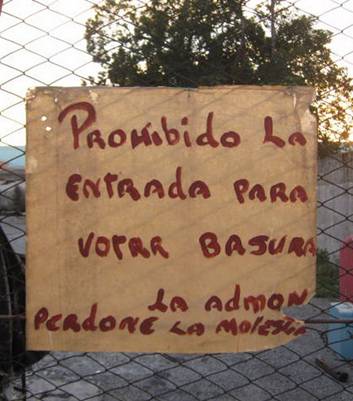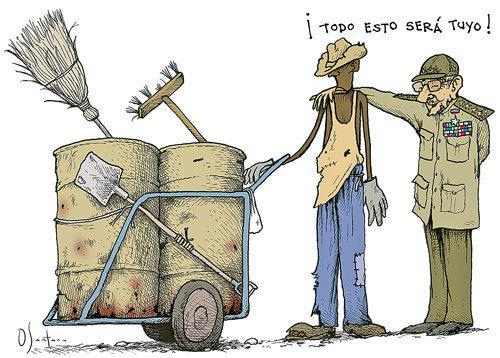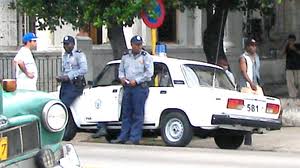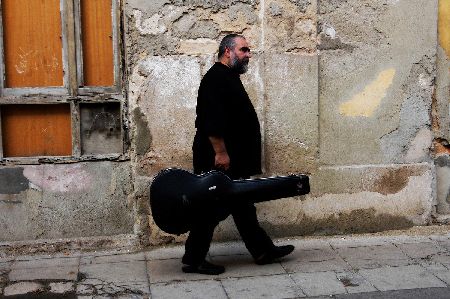
One.
In the distance, a horizon of clouds promised to relieve the temperature. From my bicycle I felt the comfort ahead of time, even though my sweat was forcing me to squint to see the semi-deserted road. On my back a backpack, inside it a bouquet of flowers.
The pedaling became much easier. Before arriving at the cemetery, a short slope slipped the tires almost to the corroded and faded double iron doors that lead into the sacred ground.
Sacred ground: crass euphemism. The depression of the cemetery of my city killed the dead.
So I arrived there. It was a Thursday in 2010, almost three in the afternoon. I was not going to visit my dead. I went for those of someone else. Those of a stranger who, from Miami, sent me on plea with his lovely mission which I had to read only once before taking it on as mine:
“I have read your blog with great pleasure, I ass that you live in Bayamo, the same town where I was born and from where I left when I was six years of age. I have never returned. I would like to ask you an enormous favor, I don’t know if you will forgive my daring to do so. Somewhere in the provincial cemetery rest the remains of my aunt Amanda. She died in a tragic accident when she was less than twenty, before I was born. According to my elderly mother, her sister was the most beautiful girl in the Bayamo of her time. Her eyes adorn the homepage of my personal blog. Would it be too much to ask you to look for her grave and put flowers on it in my name, and send me a photo so I can see the site where someone so important to us rests?”
Two.
I had only a name beginning with “A,” the year of death and the approximate month of the funeral. “Mama doesn’t remember well, Ernesto, forgive me for burdening you even more with this task.” So my search relied on two and a half pieces of data and a mountain of good will.
I was lucky: I happened on the most solicitous employee of that sad place. Cemeteries usually infect the living with their effluvia. The employee, with a translucent shirt he had to constantly pull away from his torso, bathed in sweat, and with thick glasses, put a book in front of me that seemed to hold all the truths of this world, and of another, never better said.
“Turn the pages gently,” he warned me. “Remember it’s nearly 50 years ago. Get ready for the dust.”
And there I passed my next two hours. In a volume of almost five thousand pages, written in pencil, deciphering the hieroglyphics of hurried and disinterested letters, trying to find the exact date of the burial of a lady I had never known but who was very important to someone else, a stranger. Once we knew the date she entered the necropolis, we would know the street, row and pantheon where her remains reposed.
When, a couple of hours later, the employee returned from a room behind me with the stub of a cigar in his mouth, I got up with a piece of paper in hand and some satisfaction in my voice:
“Street 12, Row 308, Grave 44 L.”
Three.
The pictures took longer than expected. Standing before the rectangle of cement that covered — like a headstone — the grave of Amanda who never made it twenty, I found myself not knowing what to do.
How to send images of such a scary place, with stinking weeds surrounding the edges of the sepulcher, a bent and rusty tin cross adorning the head, a powdery dust announcing the state of abandonment of Amanda’s grave.
I cleaned it. I straightened the cross as best I could. Without any tools, aided only by my hands and will, I cleared the site of weeds run wild. I pulled the flowers from my backpack, put them in a reliquary filled with water. My sweat pasted my T-shirt to my body. Overhead the clouds darkened the sky announcing their danger: a downpour and me on a bicycle.
Nothing mattered.
The image of a distant family, an elderly woman eyes moist, honoring with her tears the site of her beautiful sister; the image of a stranger hugging his mother, thinking about his aunt and putting into context the abstraction of his mythical Amanda; the beautiful charge of my enterprise absorbed every second of the afternoon.
When I was sure that some thirty digital photos would allow me to choose which ones to send off electronically, which would offer the best panorama, the most comprehensive, the least depressing possible, I thanked the employee with a handshake that represented myself and those exiled from Bayamo, and began to pedal once again.
Four.
No, the infamous downpour didn’t damage the digital camera. I did damage the gears of the bike which, without grease, made a noise like grasshoppers for several weeks. But the photos were safe. If I could manage to connect myself to the Internet (with my clandestine connection), in a few minutes a stranger’s afternoon would change completely.
Five.
“Dear Ernesto:
“You made me cry. I have cried for happiness and little for the melancholy of several members of my family. I will never know how to thank you for your gesture. Right now I’m a little embarrassed, when I can tell you more you will receive the mail you deserve. I just want you to know that in Miami you have one more family.”
Epilogue.
On February 20, 2011, two months and twenty days after stepping on American soil, an article entitled “Uncomfortable Freedoms” appeared on this blog. It was my position on the American restrictions on travel and remittances to Cuba — which months later I addressed in other texts — where I responsibly criticized the positions of Senators Bob Menendez and Marco Rubio.
The day after this publication, my wife received a brief message on her cell phone. I will try to reproduce it verbatim:
“I can not describe how disappointed I am Ernesto. Your article seemed to me the most hypocritical and lamentable that I have read in a long time. What a shame, having once been a true patriot.”
I smiled halfheartedly. I had just win something like an enemy, who would not hesitate in the future to employ offensive epithets against me from his patriotic and well-known blog, and between us was raised an impenetrable wall of political posturing.
I never got to know him. The lunch date set for some weekend never came to pass. I was sorry I wouldn’t get to kiss an old woman who kept intact her love for her dead sister, that I could not tell her in my own voice the details of the day when I humbly honored the memory of her Amanda.
I carefully conserve the memory of a sweaty Ernesto, determined to clean an unknown grave, excited at the thought of causing happiness in a distant home. And since then I have also conserved an almost absolute certainty: I am not disposed to believe in libertarian yearnings, in the search for the well-being of a trampled Country, from someone who is not capable of refining his own human condition.
10 January 2012
 It has been two years since I started my blog. Starting it was not an easy decision to make. Fear – such an innate human characteristic – overcame me. I had to decide if I would write using my real name, or one created by me. As a reflection of my true being, I opted to identify myself.
It has been two years since I started my blog. Starting it was not an easy decision to make. Fear – such an innate human characteristic – overcame me. I had to decide if I would write using my real name, or one created by me. As a reflection of my true being, I opted to identify myself.












